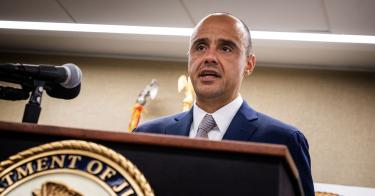Matthew Graves, the U.S. attorney for the District of Columbia, must be grateful that the Justice Department will “surge additional law enforcement tools and resources” to tackle violent crime and carjackings in the nation’s capital. But he should also be embarrassed. The announcement is a tacit admission that the city’s chief prosecutor has failed abysmally at tackling crime.
In the department’s press release, Graves is quoted as saying, “We have been surgically targeting and prosecuting those driving violence within our community.” That’s a lie, and everyone knows it: from police and community members to prosecutors in his own office and those who, disgusted by his policies, have left for other employment. One of us (Stimson) testified before the House Judiciary Committee last August about Graves’s appalling record and what needs to be done to protect visitors and residents.
Last year in Washington, D.C., there were 274 homicides (a 35% increase over 2022), 3,470 robberies (a 67% increase), 6,829 car thefts (an 82% increase), and 13,349 thefts (a 23% increase). Overall, violent crime was up 39%, and all crime was up 26% year over year.
>>> The Radicals Behind the D.C. City Council’s Pro-Criminal Policies
Carjacking is a huge problem in Washington, D.C. Last year, there were 958 carjackings—77% of which involved guns—and the police closed only 260 cases, resulting in 173 arrests. Sixty-two percent of those arrests involved juveniles, the majority of whom were 15 or 16 years old, yet Graves refuses to prosecute most violent juveniles as adults.
Despite this crime tsunami, Graves’s office of 330 prosecutors has a declination rate of 67%. Graves tries to blame everyone but himself for this problem, from the crime lab to the courts to the police, the latter of whom he says bring weak cases to his office.
The police aren’t buying it. Robert J. Contee III, the district’s former police chief, said his officers are not to blame, calling Graves’s finger-pointing “BS,” adding, “I can promise you, it’s not MPD holding the bag on this.”
Under Graves, cases are now “no papered” (i.e., rejected) at the intake stage if those cases are essentially not trial ready the day after the arrest. That makes no sense whatsoever, as virtually no case is ready for trial the day after an arrest. As he well knows—or certainly ought to know—further investigative steps are necessary in most cases to get them ready for trial, including locating other potential witnesses, forensic evidence testing, and the like.
Contrast that 67% declination rate with the San Diego district attorney’s office, which also has 330 prosecutors. That office had a 22.6% declination rate from 2000-2019 involving over 500,000 cases; meaning they charged 77.4% of the cases that were brought to them by law enforcement authorities during those two decades.
And just to be clear, this isn’t a resource problem. San Diego County has one prosecutor for every 9,927 residents of the county; Washington, D.C., has one for every 2,035 residents.
The real problem is Graves. He refuses to prosecute every case to the fullest extent of the law, pure and simple. As long as his charging policies remain the same, sending his office more prosecutors from Justice won’t make a difference. The vast majority of violent crimes are committed by a few hundred armed career criminals who act with impunity because they know the local prosecutor won’t put them in prison for their crimes. Full stop.
>>> Criminal Justice
The quickest way to tackle the gun crime problem in Washington, D.C., is for Graves to prosecute every single felon in possession of a firearm in federal district court under 18 U.S.C. § 922(g), under which most, if not all, felons would get prison time.
According to the U.S. Sentencing Commission, of the 64,142 cases prosecuted under 18 U.S.C. § 922(g) in fiscal 2022, 97.4% were sentenced to federal prison. The average sentence for all section 922(g) offenders was 63 months, just over five years. The length of sentence depends in large part on the criminal history category of the defendant. Some 15% of section 922(g) offenders were convicted of one or more statutes with a mandatory minimum penalty.
But instead of taking gun crime seriously, Graves directs his prosecutors to send gun cases, including those committed by convicted felons, to the Superior Court for the District of Columbia. They bargain those cases down to next to nothing, and most criminals end up with probation instead of the years behind bars that would have resulted had he taken them to federal district court. This is a policy choice which Graves could change today.
By hiring woke social justice warrior pseudo-prosecutors, refusing to send felon-in-possession firearms cases to federal district court, forcing his prosecutors to decline cases at intake because they aren’t “trial ready” the day after an arrest, and refusing to prosecute every violent gun-toting juvenile as an adult, Matt Graves has failed as the city’s chief prosecutor.
What Graves needs is a spine. The Justice Department can’t give him that.
This piece originally appeared in the Washington Examiner





